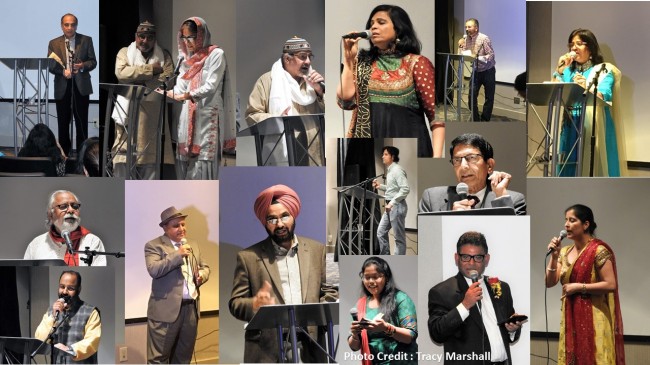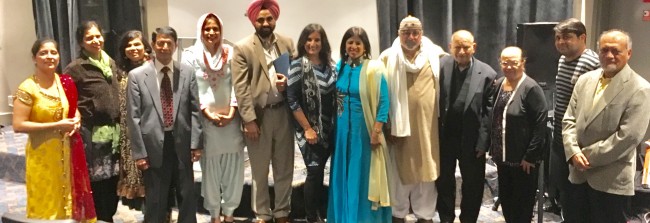
BY HARDEEP SINGH
Atlanta, GA: Bulleh Shah’s mystic poetry united people of Indian, Bangladeshi and Pakistani heritage on a common platform at the Hilton Hotel in Atlanta on May 6.
Sufi evangelists originally from the subcontinent came together to celebrate the life and poetry of Bulleh Shah – a Sufi soul, humanist and philosopher of the 18th century from the land of five rivers – Punjab.
Bulleh Shah was born and lived in Punjab, but his poems and songs have been adopted by people around the world. Lyrics of his poems, famous for their vivid style and open denunciation of religious differences, have long been held in affection by Hindus, Muslims and Sikhs. The poetry of Bulleh Shah is considered one of the jewels of pre-modern Punjabi literature, and is taught in schools and colleges on both sides of the Radcliffe line.
Bulleh Shah discoursed, “The ultimate peace of mind can be realized when one tames the ‘Me only’ instinct. One of mind’s challenges is to accept differences of opinions, thoughts, ways of life, ways to worship, way to express, etc. Unable to accept these differences keeps the mind anxious and in agony.”
Bulleh Shah, through the lyrics of his poems, challenged the meaningless ritualistic practices infested in institutionalized forms of religion. His poetry emphasized submitting to our conscience and staying truthful to our inner voice.
Waqas Khawaja, professor at Agnes Scott College shared the life history of Bulleh Shah, from his birth place until his death in Kasur. According to Prof. Khawaja, Bulleh Shah through his poetry emphasized the existence of one Divine source. A Sufi, in his mystic journey reaches a state of mind where he/she sees no difference between genders – male and female. Additionally, a Sufi mind-set is beyond the demarcation and segregation of religious lines.
Gurmeet Kaur, an author and social activist, recited the kaafi – Mai(n) KusumbRa chuN chuN haari – I picked a lot of Kusumbhs (safflowers) yet I’ve lost the game. In this kaafi Bulley Shah depicts himself as someone enraptured by the beauty of this flower and through the journey as a flower picker explains his spiritual quest for the beloved Divine.
Gurmeet concluded by reciting a poem by UKbased Punjabi poet, Amarjit Chandan, that beautifully plays on the word Vand – which means both split and share in Punjabi – referring to the split of Punjab and all that which is left to be shared. She leaves the audience with a dream of undivided Punjab brought about by the love of their common Mother, the mother language Punjabi.
Surinder Singh Lalli shared, socio-political stands taken by Bulleh Shah. Shah openly condemned organized religiosity, injustice perpetuated by establishments, and scare tactics used to control masses. Conversely, he provided solutions to the sociological problems of the world.
Bulleh Shah’s poetry is widely used in Bollywood screenplays and stage plays across the subcontinent. Kafiyaans of Bulleh Shah has been incorporated into several Bollywood film songs – Tere Ishq Nachaya, Chaiyya Chaiyya, Bullah ki Jaana Mein Kaun, Duma Dum Mast Qalandar, Sade Vehre Aya Kar, and Mera Piya Ghar Aaya.
This event was organized by Jehangir Rathore, Tahir Syal, Kamlesh Chugh, and many others who voluntarily paid tribute to the noble soul. D.V Singh, of the Indian Consulate served as chief-guest and shared a couplet of Bulleh Shah.
In the 18th century, Bulleh Shah’s poetry did the magic of uniting people of different faiths, opinions and cultures. His work continues to remain relevant and crucial in the 21st century – to unite and bond people in creating a peaceful society.



